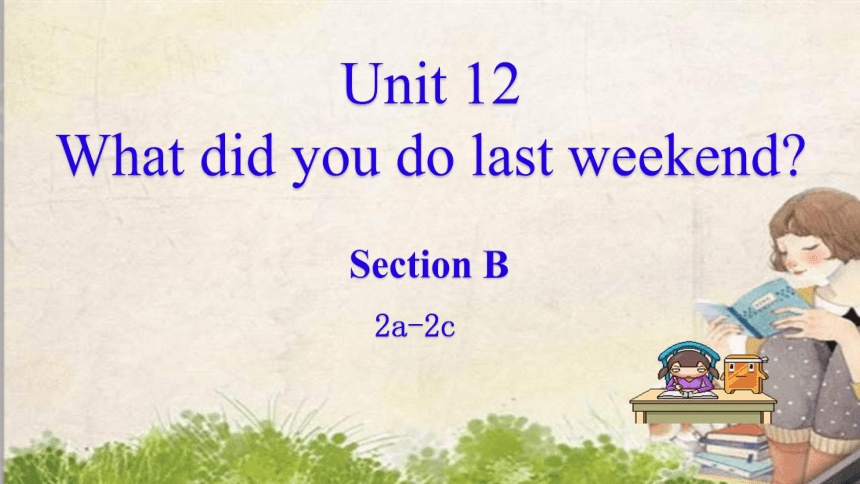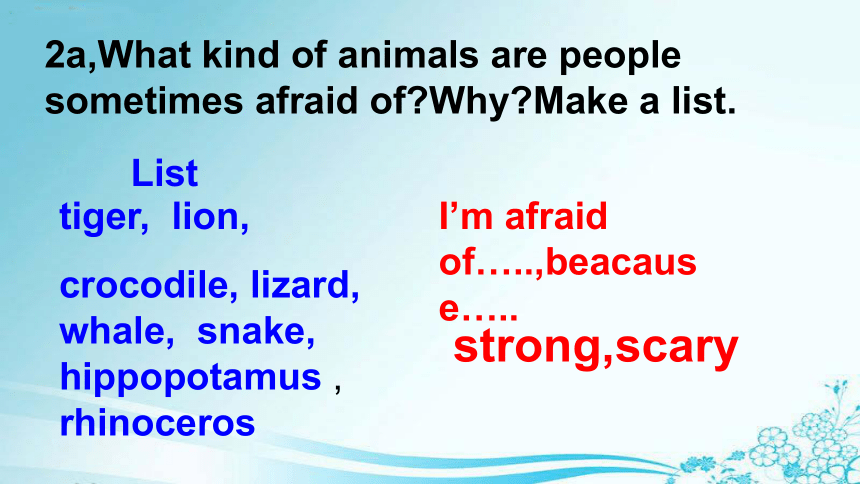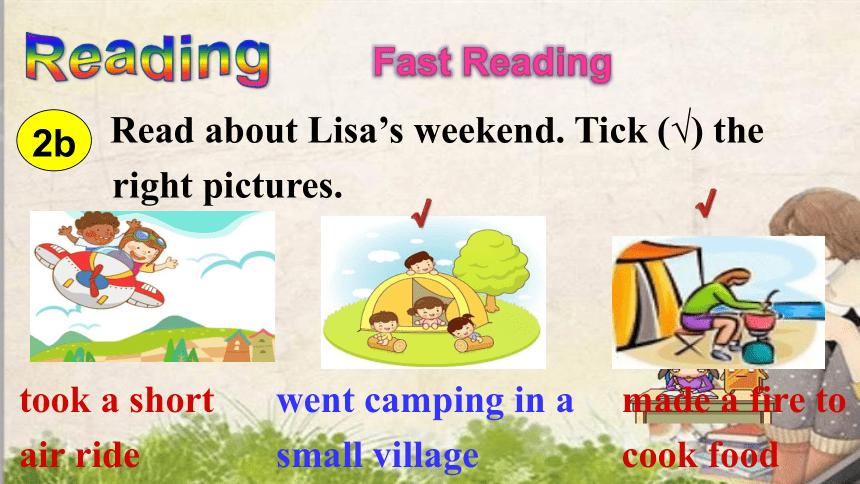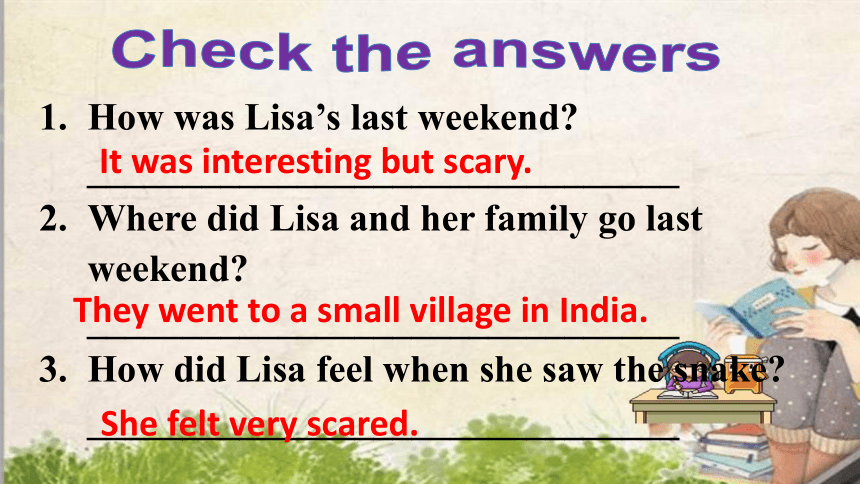人教新目标版英语七年级下Unit 12 What did you do last weekend?Section B 2a-2c 课件(34张PPT无素材)
文档属性
| 名称 | 人教新目标版英语七年级下Unit 12 What did you do last weekend?Section B 2a-2c 课件(34张PPT无素材) |  | |
| 格式 | zip | ||
| 文件大小 | 2.1MB | ||
| 资源类型 | 教案 | ||
| 版本资源 | 人教新目标(Go for it)版 | ||
| 科目 | 英语 | ||
| 更新时间 | 2020-06-29 01:35:05 | ||
图片预览












文档简介
(共34张PPT)
Unit
12
What
did
you
do
last
weekend?
Section
B
2a-2c
crocodile
['kr?k?dail]
鳄鱼
lizard
['liz?d]蜥蜴
scary
hippopotamus
河马
rhinoceros
犀牛
strong
[hip?'p?t?m?s]
[rai'n?s?r?s]
whale
鲸鱼
snake
蛇
scary
?[we?l]
?[sne?k]
2a,What
kind
of
animals
are
people
sometimes
afraid
of?Why?Make
a
list.
List
tiger,
lion,
crocodile,
lizard,
whale,
snake,
hippopotamus
,
rhinoceros
strong,scary
I’m
afraid
of…..,beacause…..
put
up
tent
put
up
a
tent
high
school
Main
words
scared
wake
up
Read
about
Lisa’s
weekend.
Tick
(√)
the
right
pictures.
Reading
Fast
Reading
took
a
short
air
ride
went
camping
in
a
small
village
made
a
fire
to
cook
food
√
2b
√
shouted
to
their
parents
two
tigers
sleeping
near
the
fire
√
1.
How
was
Lisa's
weekend?
______________________________
2.
Where
did
Lisa
and
her
family
go
last
weekend?
___________________________________________
3.
How
did
Lisa
feel
when
she
saw
the
snake?
_______________________________________
4.
What
did
Lisa
and
her
sister
do?
__________________________________
5.
What
did
their
parents
do?
Why
did
they
do
that?
__________________________________________
6.
What
lesson
did
Lisa
learn
from
the
weekend?
____________________________________________
How
was
Lisa’s
last
weekend?
_______________________________
Where
did
Lisa
and
her
family
go
last
weekend?
_______________________________
How
did
Lisa
feel
when
she
saw
the
snake?
_______________________________
She
felt
very
scared.
It
was
interesting
but
scary.
They
went
to
a
small
village
in
India.
Check
the
answers
4.
What
did
Lisa
and
her
sister
do?
______________________________
______________________
5.
What
did
their
father
do?
_____________________________
____________________________
Why
did
he
do
that?
_______________________________
Her
father
jumped
up
and
down
in
their
tent.
He
wanted
to
wake
up
the
snake.
They
shouted
to
their
parents
to
let
them
know
the
danger.
6.
What
lesson
did
Lisa
learn
from
the
weekend?
_______________________________
__________________________________________________
Snakes
don’t
have
ears
but
they
can
feel
things
moving.
It’s
important
not
to
go
near
a
snake.
2c.
Put
the
phrases
in
order
accordingto
the
passage.
Then
use
them
to
retell
the
story.
____
snake
went
into
the
forest
____
put
up
our
tents
and
cooked
food
____
learned
a
useful
lesson
____
saw
a
snake
and
shouted
to
parents
for
help
____
snakes
can’t
hear
but
can
feel
things
moving
____
my
dad
jump
up
and
down
in
his
tent
____
took
a
bus
to
a
small
village
in
India
____
told
stories
under
the
moon,
then
went
to
sleep
6
2
8
4
7
5
1
3
1.put
up
搭起;举起
put
up此处意为“搭起”,还可意为“举起;张贴;建造”。put的过去式仍为put。
eg:
It's
going
to
rain.
Let's
put
up
the
tent.
天快要下雨了,我们把帐篷搭起来吧。
Language
points
put的相关短语
put
on
穿上(衣服)
put
away
放好,把……收起来
put
down
放下;写下
—How
beautiful
the
mountain
is!
I’d
like
to____
a
tent
there.
—You’d
better
not.
(自贡)
A.
put
on
B.
put
off
C.
put
up
典例
C
A
primary
school
in
England
has______signs
at
its
three
entrances
(
入口),
saying:
Greet
your
child
with
a
smile,
not
a
mobile.
(临沂)
A.
put
into
B.
put
off
C.
put
on
D.
put
up
典例
D
【点拨】用题眼法解题。由题眼signs
可知此处表示“张贴指示牌”,应用put
up。句意:英国的一所小学在它的三个入口处已经张贴了指示牌,上面写着:笑迎你的孩子,而不是盯着你的手机。
2.so...that…
v.s.
so
that
1.
他是如此的坚定(determined),
以至于他从没有想过放弃(give
up)。
He
is
so
determined
that
he
has
never
thought
of
giving
up.
2.他跑得非常快,以至于没人能追上他(catch
up
with…)。
He
runs
so
fast
that
nobody
can
catch
up
with
him.
3.
I
got
up
early
so
that
I
could
catch
the
early
bus.
我早起是为了搭乘早班车。
3.It
is
important
(not)
to
do…
开车不打电话(talk
on
the
phone)是非常重要的。
It
is
important
not
to
talk
on
the
phone
while
driving.
2.
为保持身体健康,不吸烟是非常重要的。
It
is
important
not
to
smoke
in
order
to
keep
healthy.
3.As
a
special
gift,
our
parents
took
us
to
India.
作为一份特殊的礼物,
我爸妈带着我们去了印度。
1)
此处介词as
表示“作为……;
当作……”,其后可以接职业,用途,特点等。用在句首时,这种短语的后面往往有逗号与语句的主体隔开。例如:
As
a
student,
I
must
work
hard.
作为一名学生,我必须努力学习。
2)
本句中动词take
表示“带领”,take
…
to
…则表示“带领某人去某处”。例如:
On
Sundays,
the
father
would
take
his
son
to
the
park.
一到星期天,爸爸便会带他的儿子去公园。
辨析:
bring,
take,
bring
意为“拿来,带来”,表示“拿到靠说话人近的地方”。
take
意为“拿走,带走”,表示“拿到远离说话人远的地方”。
The
Young
Pioneer
______
water
for
the
old
man
every
day.
A.
fetches
B.
brings
C.
takes
D.
carries
答案:选D。
bring从远处把某物拿到跟前;take…(with)随身带上某物,即物就在旁边;通过用力搬运、扛、抬等,那是carry的能力范围;fetch去把某物拿来,强调的是“去、回”双线行为。
4...
let
them
know...
……让他们知道……
let
sb.do
sth.意为“让某人做某事”,其中let为使役动词,其后需接省略to的动词不定式作宾语补足语。其否定式可表示为let
sb.not
do
sth.或don't
let
sb.do
sth.意为“不让某人做某事”。
eg:
Let
him
come
here
at
once.让他立刻到这儿来。
Let
him
not
come
in.别让他进来。
在let,
make,
have等使役动词后面应跟不带to的动词不定式作宾语补足语。
eg:
What
makes
you
think
I'm
a
farmer?
是什么使你认为我是一个农民?
I
will
have
my
brother
repair
the
radio
for
you.
我将让我的哥哥给你修理收音机。
拓展【难点】
weekend
Who
When
and
where
How
was
their
weekend?
What
did
they
do?
the
first
day
the
next
day
What
did
they
learn?
Let's
retell!
How
to
save
ourselves
when
we
meet
scary
animals?
be
calm
(保持冷静)
don't
disturb
it(不要惊扰)
一、根据中文意思或首字母提示,用单词的适当形式填空,每空一词。
1.
I
got
a
_____________(惊讶)
when
I
saw
the
bill.
2.
Don’t
walk
into
the
___________(森林).
There
are
many
dangerous
animals
in
it.
3.
There
is
something
wrong
with
my
e________.
I
can’
hear
clearly.
4.
We
s________
to
the
driver,
but
he
didn’t
hear
us.
5.
My
family
_________
(搬去)to
Beijing
two
years
ago.
surprise
forest
ars
houted
moved
二.根据图片内容、提示词汇及标点写出正确的英语句子或对话。
1.
what,
you,
last
weekend,
with,
classmate
—______________________________________?
—______________________________________.
What
did
you
do
last
weekend
I
went
boating
with
my
classmate
2.
sister,
fly,
park,
yesterday
_________________________________________.
3.
walk,
family,
after
dinner,
yesterday
_________________________________________
_________________________________________.
My
sister
flew
a
kite
in
the
park
yesterday
My
family
took
a
walk
in
the
countryside
after
dinner
yesterday
4.
where,
they,
forest,
last
summer
—______________________________________?
—______________________________________.
Where
did
they
camp
last
summer
They
camped
in
the
forest
三、根据汉语完成句子
1.
我们坐了很久的公共汽车到那片森林。
We
a
to
the
________.
2.
猴子们开始上蹿下跳。
The
monkeys
started
to
and
.
3.
我们搭帐篷,
生火以便取暖。
We
our
tents
and
a
fire
to
keep
us
warm.
took
long
bus
ride
forest
jump
up
down
put
up
made
4.
我爸爸今天早上六点叫醒了我,
然后我们开始跑步。
My
dad
me
at
six
this
morning
and
then
we
.
5.
这位老人去年搬进了一所大房子。
The
old
man
a
big
house
last
year.
woke
up
started/began
to
run
moved
into
Homework
Write
a
short
passage
about
what
you
did
last
weekend?
(Writing
tips:who,
where,
when,
how...)
Thank
you
Unit
12
What
did
you
do
last
weekend?
Section
B
2a-2c
crocodile
['kr?k?dail]
鳄鱼
lizard
['liz?d]蜥蜴
scary
hippopotamus
河马
rhinoceros
犀牛
strong
[hip?'p?t?m?s]
[rai'n?s?r?s]
whale
鲸鱼
snake
蛇
scary
?[we?l]
?[sne?k]
2a,What
kind
of
animals
are
people
sometimes
afraid
of?Why?Make
a
list.
List
tiger,
lion,
crocodile,
lizard,
whale,
snake,
hippopotamus
,
rhinoceros
strong,scary
I’m
afraid
of…..,beacause…..
put
up
tent
put
up
a
tent
high
school
Main
words
scared
wake
up
Read
about
Lisa’s
weekend.
Tick
(√)
the
right
pictures.
Reading
Fast
Reading
took
a
short
air
ride
went
camping
in
a
small
village
made
a
fire
to
cook
food
√
2b
√
shouted
to
their
parents
two
tigers
sleeping
near
the
fire
√
1.
How
was
Lisa's
weekend?
______________________________
2.
Where
did
Lisa
and
her
family
go
last
weekend?
___________________________________________
3.
How
did
Lisa
feel
when
she
saw
the
snake?
_______________________________________
4.
What
did
Lisa
and
her
sister
do?
__________________________________
5.
What
did
their
parents
do?
Why
did
they
do
that?
__________________________________________
6.
What
lesson
did
Lisa
learn
from
the
weekend?
____________________________________________
How
was
Lisa’s
last
weekend?
_______________________________
Where
did
Lisa
and
her
family
go
last
weekend?
_______________________________
How
did
Lisa
feel
when
she
saw
the
snake?
_______________________________
She
felt
very
scared.
It
was
interesting
but
scary.
They
went
to
a
small
village
in
India.
Check
the
answers
4.
What
did
Lisa
and
her
sister
do?
______________________________
______________________
5.
What
did
their
father
do?
_____________________________
____________________________
Why
did
he
do
that?
_______________________________
Her
father
jumped
up
and
down
in
their
tent.
He
wanted
to
wake
up
the
snake.
They
shouted
to
their
parents
to
let
them
know
the
danger.
6.
What
lesson
did
Lisa
learn
from
the
weekend?
_______________________________
__________________________________________________
Snakes
don’t
have
ears
but
they
can
feel
things
moving.
It’s
important
not
to
go
near
a
snake.
2c.
Put
the
phrases
in
order
accordingto
the
passage.
Then
use
them
to
retell
the
story.
____
snake
went
into
the
forest
____
put
up
our
tents
and
cooked
food
____
learned
a
useful
lesson
____
saw
a
snake
and
shouted
to
parents
for
help
____
snakes
can’t
hear
but
can
feel
things
moving
____
my
dad
jump
up
and
down
in
his
tent
____
took
a
bus
to
a
small
village
in
India
____
told
stories
under
the
moon,
then
went
to
sleep
6
2
8
4
7
5
1
3
1.put
up
搭起;举起
put
up此处意为“搭起”,还可意为“举起;张贴;建造”。put的过去式仍为put。
eg:
It's
going
to
rain.
Let's
put
up
the
tent.
天快要下雨了,我们把帐篷搭起来吧。
Language
points
put的相关短语
put
on
穿上(衣服)
put
away
放好,把……收起来
put
down
放下;写下
—How
beautiful
the
mountain
is!
I’d
like
to____
a
tent
there.
—You’d
better
not.
(自贡)
A.
put
on
B.
put
off
C.
put
up
典例
C
A
primary
school
in
England
has______signs
at
its
three
entrances
(
入口),
saying:
Greet
your
child
with
a
smile,
not
a
mobile.
(临沂)
A.
put
into
B.
put
off
C.
put
on
D.
put
up
典例
D
【点拨】用题眼法解题。由题眼signs
可知此处表示“张贴指示牌”,应用put
up。句意:英国的一所小学在它的三个入口处已经张贴了指示牌,上面写着:笑迎你的孩子,而不是盯着你的手机。
2.so...that…
v.s.
so
that
1.
他是如此的坚定(determined),
以至于他从没有想过放弃(give
up)。
He
is
so
determined
that
he
has
never
thought
of
giving
up.
2.他跑得非常快,以至于没人能追上他(catch
up
with…)。
He
runs
so
fast
that
nobody
can
catch
up
with
him.
3.
I
got
up
early
so
that
I
could
catch
the
early
bus.
我早起是为了搭乘早班车。
3.It
is
important
(not)
to
do…
开车不打电话(talk
on
the
phone)是非常重要的。
It
is
important
not
to
talk
on
the
phone
while
driving.
2.
为保持身体健康,不吸烟是非常重要的。
It
is
important
not
to
smoke
in
order
to
keep
healthy.
3.As
a
special
gift,
our
parents
took
us
to
India.
作为一份特殊的礼物,
我爸妈带着我们去了印度。
1)
此处介词as
表示“作为……;
当作……”,其后可以接职业,用途,特点等。用在句首时,这种短语的后面往往有逗号与语句的主体隔开。例如:
As
a
student,
I
must
work
hard.
作为一名学生,我必须努力学习。
2)
本句中动词take
表示“带领”,take
…
to
…则表示“带领某人去某处”。例如:
On
Sundays,
the
father
would
take
his
son
to
the
park.
一到星期天,爸爸便会带他的儿子去公园。
辨析:
bring,
take,
bring
意为“拿来,带来”,表示“拿到靠说话人近的地方”。
take
意为“拿走,带走”,表示“拿到远离说话人远的地方”。
The
Young
Pioneer
______
water
for
the
old
man
every
day.
A.
fetches
B.
brings
C.
takes
D.
carries
答案:选D。
bring从远处把某物拿到跟前;take…(with)随身带上某物,即物就在旁边;通过用力搬运、扛、抬等,那是carry的能力范围;fetch去把某物拿来,强调的是“去、回”双线行为。
4...
let
them
know...
……让他们知道……
let
sb.do
sth.意为“让某人做某事”,其中let为使役动词,其后需接省略to的动词不定式作宾语补足语。其否定式可表示为let
sb.not
do
sth.或don't
let
sb.do
sth.意为“不让某人做某事”。
eg:
Let
him
come
here
at
once.让他立刻到这儿来。
Let
him
not
come
in.别让他进来。
在let,
make,
have等使役动词后面应跟不带to的动词不定式作宾语补足语。
eg:
What
makes
you
think
I'm
a
farmer?
是什么使你认为我是一个农民?
I
will
have
my
brother
repair
the
radio
for
you.
我将让我的哥哥给你修理收音机。
拓展【难点】
weekend
Who
When
and
where
How
was
their
weekend?
What
did
they
do?
the
first
day
the
next
day
What
did
they
learn?
Let's
retell!
How
to
save
ourselves
when
we
meet
scary
animals?
be
calm
(保持冷静)
don't
disturb
it(不要惊扰)
一、根据中文意思或首字母提示,用单词的适当形式填空,每空一词。
1.
I
got
a
_____________(惊讶)
when
I
saw
the
bill.
2.
Don’t
walk
into
the
___________(森林).
There
are
many
dangerous
animals
in
it.
3.
There
is
something
wrong
with
my
e________.
I
can’
hear
clearly.
4.
We
s________
to
the
driver,
but
he
didn’t
hear
us.
5.
My
family
_________
(搬去)to
Beijing
two
years
ago.
surprise
forest
ars
houted
moved
二.根据图片内容、提示词汇及标点写出正确的英语句子或对话。
1.
what,
you,
last
weekend,
with,
classmate
—______________________________________?
—______________________________________.
What
did
you
do
last
weekend
I
went
boating
with
my
classmate
2.
sister,
fly,
park,
yesterday
_________________________________________.
3.
walk,
family,
after
dinner,
yesterday
_________________________________________
_________________________________________.
My
sister
flew
a
kite
in
the
park
yesterday
My
family
took
a
walk
in
the
countryside
after
dinner
yesterday
4.
where,
they,
forest,
last
summer
—______________________________________?
—______________________________________.
Where
did
they
camp
last
summer
They
camped
in
the
forest
三、根据汉语完成句子
1.
我们坐了很久的公共汽车到那片森林。
We
a
to
the
________.
2.
猴子们开始上蹿下跳。
The
monkeys
started
to
and
.
3.
我们搭帐篷,
生火以便取暖。
We
our
tents
and
a
fire
to
keep
us
warm.
took
long
bus
ride
forest
jump
up
down
put
up
made
4.
我爸爸今天早上六点叫醒了我,
然后我们开始跑步。
My
dad
me
at
six
this
morning
and
then
we
.
5.
这位老人去年搬进了一所大房子。
The
old
man
a
big
house
last
year.
woke
up
started/began
to
run
moved
into
Homework
Write
a
short
passage
about
what
you
did
last
weekend?
(Writing
tips:who,
where,
when,
how...)
Thank
you
同课章节目录
- Unit 1 Can you play the guitar?
- Section A
- Section B
- Unit 2 What time do you go to school?
- Section A
- Section B
- Unit 3 How do you get to school?
- Section A
- Section B
- Unit 4 Don't eat in class.
- Section A
- Section B
- Unit 5 Why do you like pandas?
- Section A
- Section B
- Unit 6 I'm watching TV.
- Section A
- Section B
- Review of Units 1-6
- Unit 7 It's raining!
- Section A
- Section B
- Unit 8 Is there a post office near here?
- Section A
- Section B
- Unit 9 What does he look like?
- Section A
- Section B
- Unit 10 I'd like some noodles.
- Section A
- Section B
- Unit 11 How was your school trip?
- Section A
- Section B
- Unit 12 What did you do last weekend?
- Section A
- Section B
